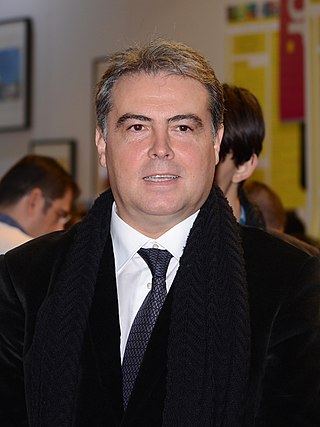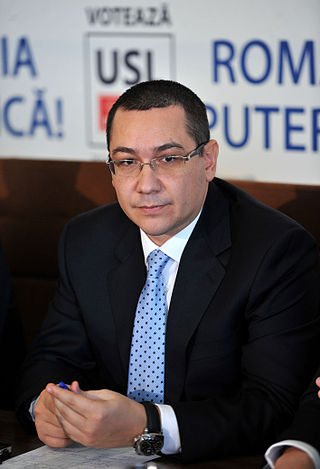
Romania's political framework is a semi-presidential representative democratic republic where the Prime Minister is the head of government while the President,according to the constitution,has a more symbolic role,is responsible for the foreign policy,signs certain decrees,approves laws promulgated by the parliament,and nominates the head of government. Romania has a democratic,multi-party system,with legislative power vested in the government and the two chambers of the Parliament,more specifically the Chamber of Deputies and the Senate. The judiciary is independent of the executive and the legislature. From 1948 until 1989,the communist rule political structure took place in the framework of a one-party socialist republic governed by the Romanian Communist Party (PCR) as its only legal party.
Moldovan or Moldavian is one of the two local names for the Romanian language in Moldova. Moldovan was declared the official language of Moldova in Article 13 of the constitution adopted in 1994,while the 1991 Declaration of Independence of Moldova used the name Romanian. In 2003,the Moldovan parliament adopted a law defining Moldovan and Romanian as glottonyms for the same language. In 2013,the Constitutional Court of Moldova interpreted that Article 13 of the constitution is superseded by the Declaration of Independence,thus giving official status to the name Romanian. The breakaway region of Transnistria continues to recognize "Moldovan" as one of its official languages,alongside Russian and Ukrainian. Ukraine also continued until recently to make a distinction between Moldovan and Romanian,with one village declaring its language to be Romanian and another declaring it to be Moldovan,though Ukrainian officials have announced an intention to remove the legal status of Moldovan. On 16 November,the Ministry of Education and Science of the Ukrainian government stated that it has initiated steps to abolish the Moldovan language and to replace it with Romanian. On 13 January 2024,Ukrainian newspaper Dumska reported that the Ukrainian Ministry of Education and Science had announced all 16 schools in Odesa Oblast teaching "Moldovan" had dropped the term in favor of Romanian. On 16 March 2023,the Moldovan Parliament approved a law on referring to the national language as Romanian in all legislative texts and the constitution. On 22 March,the president of Moldova,Maia Sandu,promulgated the law.

Adrian Năstase is a Romanian jurist,academic/professor,blogger,and former politician who served as the prime minister of Romania from December 2000 to December 2004.

The Social Democratic Party is the largest political party in Romania,though in the European Parliament,it is the second largest by total number of political representatives,after the National Liberal Party (PNL). It is also the largest social democratic political party in the country. It was founded by Ion Iliescu,Romania's first democratically elected president at the 1990 Romanian general election. It is currently part of the National Coalition for Romania (CNR),which is a big tent grand coalition comprising also the National Liberal Party (PNL). The CNR formerly included the Democratic Alliance of Hungarians in Romania (UDMR/RMDSZ) until mid June 2023.

Dan Mircea Geoană is a Romanian politician and diplomat,deputy secretary general of NATO since 2019,who served as president of the Senate of Romania from 20 December 2008 until he was revoked on 23 November 2011. From 21 April 2005 until 21 February 2010,he was the head of the Social Democratic Party,making him the longest-serving president of the PSD.

Adrian Mihai Cioroianu is a Romanian historian,politician,journalist,and essayist. A lecturer for the History Department at the University of Bucharest,he is the author of several books dealing with Romanian history. He is also noted for his contribution as co-author of a high school textbook.

Titus Corlățean is a Romanian politician and diplomat,former Minister of Justice and of Foreign Affairs. He is a member of the Social Democratic Party (PSD),part of the Party of European Socialists,and was elected to the Chamber of Deputies for Brașov County in the 2004 elections.

The third cabinet of prime minister of Romania Petre Roman took office from 30 April 1991 up until 16 October 1991. It was the 109th overall cabinet of Romania and ended three weeks after the September 1991 Mineriad which occurred in Bucharest. It was a single-party majority cabinet,plus independents.

Belarus and Romania officially established diplomatic relations on 14 February 1992. Currently,Belarus has an embassy in Bucharest,while Romania has an embassy in Minsk.

Gabriel Oprea is a Romanian politician and a general in the army reserves. The former president of the National Union for the Progress of Romania (UNPR) and a former member of the Social Democratic Party (PSD) who is now an independent,he was a member of the Romanian Chamber of Deputies for Ilfov County from 2004 to 2012 and was a Senator for Bucharest from 2012 to 2016.

Ilie Sârbu is a Romanian theologian,economist and politician. A member of the Social Democratic Party (PSD),he sat in the Romanian Senate from 2004 to 2015,representing TimișCounty. In the Adrian Năstase cabinet,he was Agriculture Minister from 2000 until July 2004,and he held the same position in the Emil Boc cabinet between 2008 and 2009. He was Senate President for six weeks in 2008.

Victor Viorel Ponta is a Romanian jurist and politician,who served as Prime Minister of Romania between his appointment by President Traian Băsescu in May 2012 and his resignation in November 2015. A former member of the Social Democratic Party (PSD) and its leader from 2010 to 2015,he was also joint leader (2012–2014) of the then-governing Social Liberal Union (USL),an alliance with the National Liberal Party (PNL). Ponta was a member of the Romanian Chamber of Deputies for Gorj County from 2004 to 2020. In the Emil Boc cabinet,he was Minister-Delegate for Relations with Parliament from 2008 to 2009.

Cristian Diaconescu is a Romanian jurist and politician. He previously belonged to the National Union for the Progress of Romania (UNPR) and the Social Democratic Party (PSD),as well as to the People's Movement Party (PMP),which he led from 2021 to 2022. He sat in the Romanian Senate from 2004 to 2012,representing Constanța County from 2004 until 2008,and subsequently Bucharest. In the Adrian Năstase cabinet,he was Minister of Justice from March to December 2004;in the Emil Boc cabinet,he was Minister of Foreign Affairs between 2008 and 2009. He returned to the position in 2012,also under Boc,and continued in this capacity under Boc's successor,Mihai Răzvan Ungureanu.

Iurie Leancă is a Moldovan politician who was the Prime Minister of Moldova from 2013 until 2015. He was Minister of Foreign Affairs and European Integration from 2009 to 2013 as part of the First and Second Filat Cabinet.
Rodica Mihaela Stănoiu is a Romanian jurist and politician. A member of the Social Democratic Party (PSD) and later the Conservative Party (PC),she was a member of the Romanian Senate for Olt County from 1996 to 2008,with a hiatus in March–December 2004. In the Adrian Năstase cabinet,she was Minister of Justice from 2000 to 2004.

Presidential elections were held in Romania in 2014. They were the seventh presidential elections held in post-1989 Romania. In the first round of the elections on 2 November,the top two of the fourteen candidates qualified in a run-off on 16 November. These candidates were Victor Ponta,former Prime Minister and ex-leader of the Social Democratic Party (PSD) who won around 40% of the vote in the first round,and Klaus Iohannis,then mayor of Sibiu and leader of the Christian Liberal Alliance (ACL),who won around 30% in the first round respectively. Following large protests on how Ponta's government organized the elections in the diaspora,Klaus Iohannis staged a surprising come-back and won the run-off with 54.5%,or more than a million votes than his contender.
The 2012 Romanian constitutional crisis was a major political and constitutional conflict between President Traian Băsescu and Prime Minister Victor Ponta of Romania. A dispute arose between the two regarding the representation of Romania to the European Council reunion of June 28,2012. The dispute degenerated in civil disobedience and conflicting views between political parties. On 12 December 2012,Băsescu and Ponta signed an agreement on institutional cohabitation,effectively ending the crisis.
This is a list of 2014 events that occurred in Romania.
During the first days of June 2015,the Government of Romania was rocked by criminal investigation against Prime Minister Victor Ponta for 19 acts of corruption between 2007 and 2008,when he was lawyer. Moreover,Victor Ponta is also investigated for conflict of interest during his premiership,when he propelled Dan Șova,political ally and friend,in government positions. His resignation was demanded by President Klaus Iohannis and several figures in opposition. Victor Ponta denied the allegations and refused to resign,plunging the country into the second political crisis in just three years.
Events from the year 2022 in Romania.

















